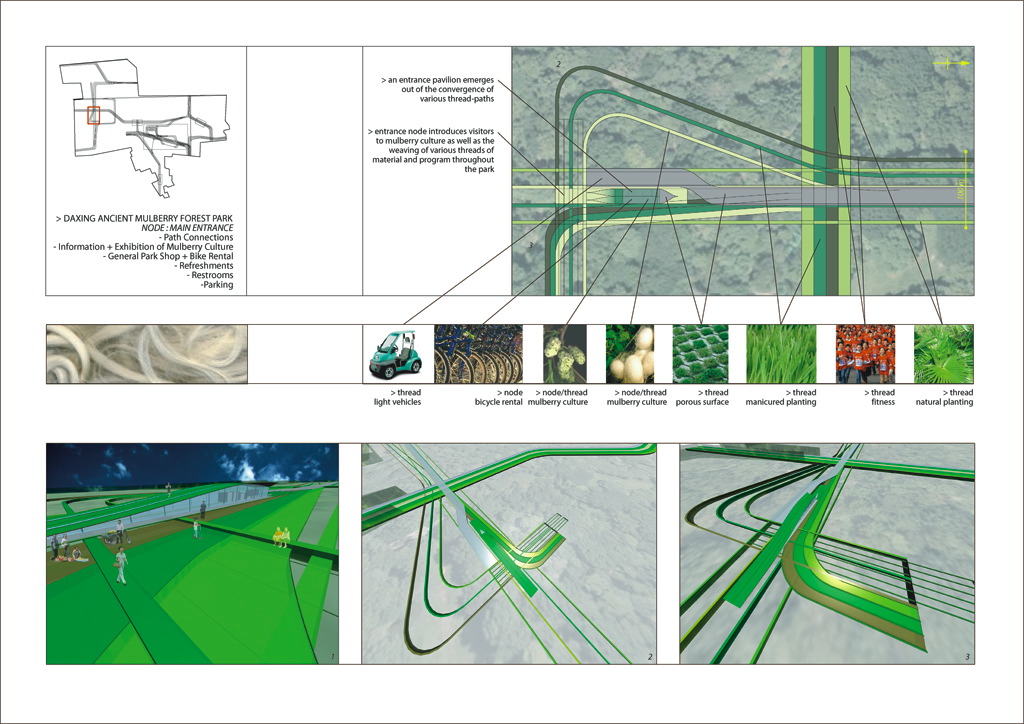
Daxing Royal Ancient Mulberry Park - Beijing, China
Jason Vigneri-Beane <jcvb@splitstudio.com>
Project Statement
One thousand threads is ten thousand streams. - proverb
In order to construct both a culturally and instrumentally rich approach to the planning of the Daxing Ancient Mulberry Forest Park we have looked to mulberry culture, the silkmoth, and the production of silk. In particular, the intricacy that is possible in threading silk has provided a model for the way in which we have conceived of the organization of the park. In a sense, the site is already a fabric that consists of many patches (orchards, villages, properties) and many threads (roads, canals, utility paths). In keeping with this model of threads and fabrics, we propose a new plan for the park that is based on multiple streaming threads that can diverge, converge, and adapt to the delicate environment of the site. These threads can be flexible while still giving a consistent organizational identity to the park in such a way that responds to the site without opposing it.
Each thread can carry with it a category of program (ex. walking, fitness) and a category of material (ex. natural planting, porous surface) in order to weave social functions and identifiable landscapes throughout this natural environment. When various threads converge they produce moments of programmatic importance where visitors to the park can find facilities and larger landscapes that provide for collective activities. When threads begin to diverge into individual paths visitors can find themselves on routes that will allow them to wander through the forests. The intention of this combination of convergence and divergence is to give both collective experiences (cultural, social, economic) and individual experiences (contemplation, exploration). While the threads can sponsor as collective an experience as recreation, conferencing, or orchard picking and as individualized and experience as a wandering path through an orchard they can also bundle together to form both landscapes and the architectural aspects of the park. Therefore, our approach to the architectural component of the park is not to conceive of the architecture as something that is different than the landscape. Instead, we propose that the architecture simply emerges out of the landscape itself. Because the threads are so responsive they can emerge out of the ground in order to form landscape buildings with green roofs. This approach seeks to produce a distinct but blended relationship between building and landscape. In addition, by providing landscape roofs the area that is taken by the building with be given back to the visitors of the park in the form of a new ground that rises to contain its various functions.
The principle of the architecture emerging out of the landscape is connected to that of the landscape emerging out of the system of programmed circulatory threads that provide both the metaphor and the instrument of this planning proposal. In a sense, the park is organized by a system of paths that lead visitors through a series of nodes. Nodes can take on different scales and different programs that make them adaptable to their immediate surroundings yet connected to an overall park-wide network. For example, nodes can adapt to accommodate orchard picking and shops in some parts of the park, mulberry culture and exhibitions in other parts of the park, and recreation in still other parts of the park. In addition, nodes can accumulate to form the main programmatic area of the park where the visitors' center and the conferencing facilities are located. Through these interconnected relationships among architecture, landscape, program, and circulation this proposal aspires to give a full and intricate experience to visitors by weaving social, cultural, and economic possibilities throughout this historically meaningful and potentially beautiful environment.
With: IDEA-ARCH (Qun Dang, Steve Zuo); Landscape Consultants: QRP (Peter Rothschild); Split Studio (Amy Herda, Sophia Razzaque, Katja Rinderspacher, Scott Sinclair)